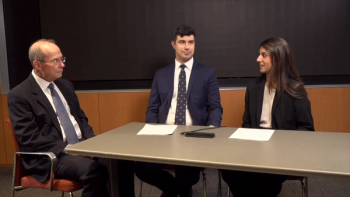
- Ophthalmology Times: August 2020
- Volume 45
- Issue 13
Working with optometrists is winning strategy
Sharing postoperative care can lead to better work-life balance
This article was reviewed by Devesh Varma, MD, FRCPC
Ophthalmologists should consider asking optometrists to help them follow up with patients who have undergone
It will be especially important as they potentially face an increasing workload with an aging population.
According to Devesh Varma, MD, FRCPC, an assistant professor of ophthalmology at the University of Toronto in Ontario and an ophthalmologist and senior partner at the Prism Eye Institute, this proved to be one of the best decisions he ever made.
Related:
At the annual Toronto Cataract Course in February, Varma discussed delegating and comanaging postoperative intraocular lens implant care with optometry, taking the pro position in the debate.
“I felt overworked, and I really saw no relief in sight,” he said, describing his choice to team up with an optometrist who would follow up with his patients who had undergone
Varma noted that ophthalmologists and optometrists who team up likely will have different objectives.
“He (the optometrist) wanted to learn and change his scope of practice, and I wanted to bring joy back to my work and be at home with my family before my kids went to bed,” Varma said.
Varma added that he emphasized to the optometrist that the collaboration was not about increasing revenue.
Related:
“I told him that I was not hiring him to make more money,” Varma said. “Rather, the goal was to serve more patients, maintain high quality, and do it in a way that was personally and professionally sustainable.”
After 4 years of collaboration, it has made a significant change in Varma’s practice, enabling him able to see many more patients while reducing the number of hours he works each week.
Varma noted his patients have expressed great satisfaction with the optometrist, who sees them for postoperative follow-up.
“I now serve 5000 more patients annually (compared with before the collaboration),” he said. “Out of those, 1000 are new consults that I could not have seen before. My wait time for a consult used to be 8 months, and individuals (who needed
According to Varma, patients are having a better experience.
“I used to routinely run 2 hours over time,” Varma said. "Also, my consult wait time now is 2 months or less. If I need to see someone the same day I can, and I still make it home for dinner on time.”
Related:
Management choices
The management choices that the optometrist who works with Varma makes, in following Varma’s surgical patients postoperatively, are aligned with the choices Varma would make himself, he noted.
“I am not changing his management in 99.9% of the cases, which is impressive,” Varma said.
Over a 30-day period, the optometrist working with Varma correctly diagnosed a patient with malignant glaucoma, which presented unexpectedly posoperatively, and a preoperative patient with previously undisclosed traumatic
Because the optometrist now is managing
“The most important thing is that I have the time to dig into more complex cases,” Varma said. “I am no longer doing routine postoperative checks. I have time for my family and for myself, and I love my job again.”
Related:
A win-win
Since the optometrist began collaborating with Varma, he has become a national thought leader and enjoys the fact that he is no longer working in isolation, according to Varma.
Varma dismissed concerns that an increased scope of practice for optometrists is a threat to ophthalmologists.
“Working with optometrists is not sowing the seeds of our demise,” he said. “Collaboration is far better than combat.”
Moreover, there is not much enhanced value provided by an ophthalmologist if follow-up care can be safely delegated to an optometrist, Varma said.
Related:
“What value are you adding if you are doing a fast, easy job?” asked Varma, who challenged all eye care providers to work at the top of their licenses.
Ultimately, failing to delegate and comanage
“People are aging,” he said. “If you do not get help, you will get crushed.
--
Devesh Varma MD, FRCPC
p: 905-456-3937
Dr. Varma has no financial disclosures related to this content.
Articles in this issue
over 5 years ago
Artificial tears offer a path to contact lens comfortover 5 years ago
Experts review state of AMD in 2020over 5 years ago
An ophthalmologist faces down COVID-19over 5 years ago
Performing follow-up perfects surgical techniqueover 5 years ago
Physicians’ treatment decisions are reinforced with good dataNewsletter
Don’t miss out—get Ophthalmology Times updates on the latest clinical advancements and expert interviews, straight to your inbox.





























